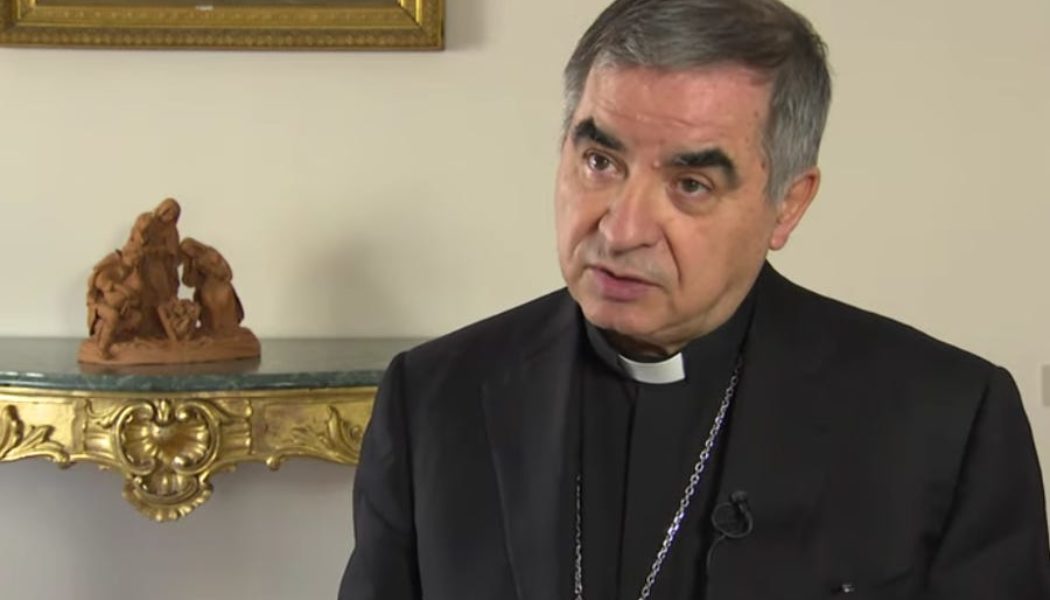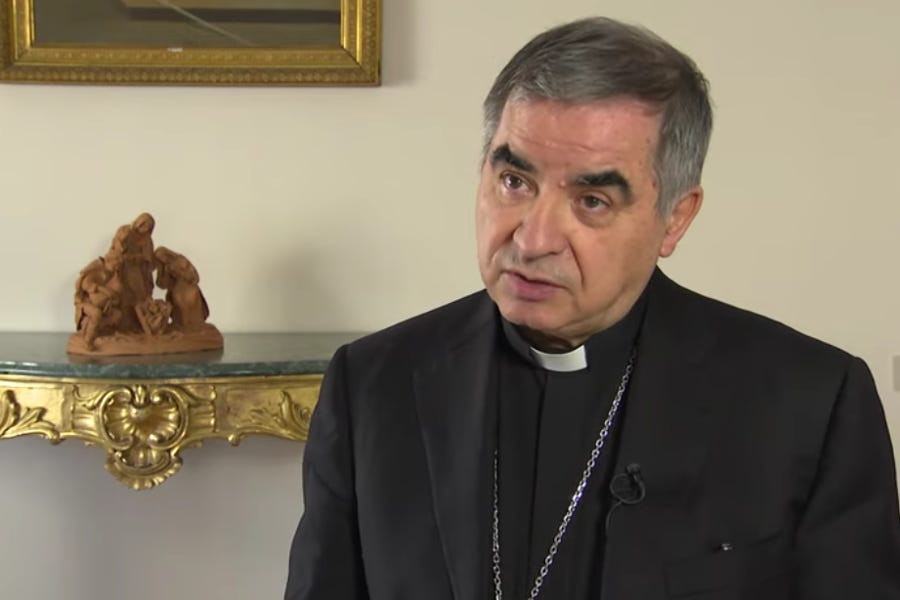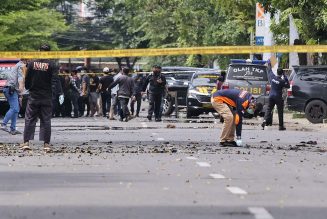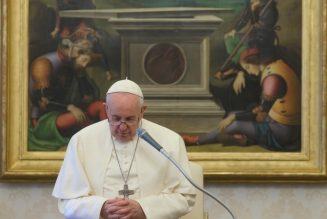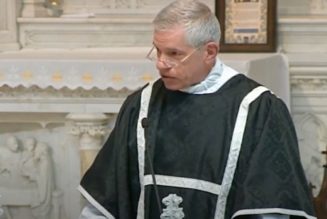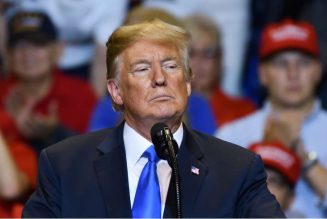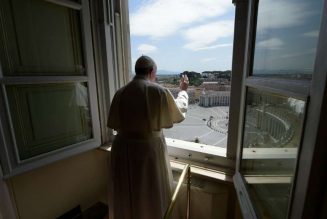The long-running Vatican finance trial ended Saturday with a guilty verdict for Cardinal Giovanni Angelo Becciu, along with convictions for several other former Vatican officials and businessmen who worked with the Vatican.
Judge Giuseppe Pignatone read out the highly anticipated verdicts Dec. 16 against 14 defendants — 10 individuals and four companies — who faced 49 charges.
The 10 individuals received the following verdicts, according to a statement from the Tribunal of Vatican City State:
Cardinal Becciu, a former Substitute (Sostituto) of the Secretariat of State, received a sentence of five years and six months, a fine of 8,000 euros (around $8,700), and perpetual disqualification from holding public office. His lawyers said he would appeal the verdict.
Enrico Crasso, a financial consultant to the Vatican Secretariat of State, was given a seven-year sentence, a fine of 10,000 euros (roughly $10,900), and perpetual disqualification from holding public office.
Cecilia Marogna, a self-styled security consultant, received a sentence of three years and nine months, with disqualification from public office for the same period.
Raffaele Mincione, an Anglo-Italian businessman, was given a sentence of five years, a fine of 8,000 euros ($8,700), and perpetual disqualification from holding public office.
Fabrizio Tirabassi, a former employee of the Secretariat of State, was given seven years and six months, a 10,000 euro fine ($10,900), and perpetual disqualification from holding public office.
Gianluigi Torzi, an Italian businessman, received a six-year sentence, a fine of 6,000 euros ($6,500), and perpetual disqualification from holding public office. He is also subject to special supervision for a year.
René Brülhart, the former president of the Financial Information Authority (AIF, now ASIF), was given a fine of 1,750 euros (roughly $1,900).
Tommaso Di Ruzza, the former director of the AIF, also received a fine of 1,750 euros.
Nicola Squillace, an Italian lawyer, received a suspended sentence of a year and 10 months.
Msgr. Mauro Carlino, a former official at the Vatican Secretariat of State, was acquitted of all charges.
The four companies that faced charges were Logsic Humitarne Dejavnosti, owned by Marogna, and three linked to Crasso: Prestige Family Office Sa; Sogenel Capital Investment, and HP Finance LLC.
Logsic Humitarne Dejavnosti received a penalty of 40,000 euros (around $44,000) and a ban on contracting with public authorities for two years. The other three companies were acquitted of the charges.
The Vatican court also ordered the confiscation of more than 166 million euros (around $181 million). The defendants were sentenced, jointly and severally, to pay damages of more than 200 million euros (roughly $218 million) to the civil parties to the trial.
The marathon trial featured 69 witness testimonies, 124,563 printed and electronic pages, and 2,479,062 files presented by the prosecution. The defense deposited more than 20,000 pages with attachments, while civil parties presented 48,731.
Cardinal Becciu had faced formal charges of abuse of office, embezzlement, conspiracy, and witness tampering. The prosecution asked for a seven-year prison sentence for the cardinal.
Throughout the trial, Becciu repeatedly asserted his innocence, and frequently blamed his departmental staff, cited lapses in his memory, and sought to pass responsibility for his actions to Pope Francis.
The trial had 86 hearings after it began more than two years ago, following the formal filing of charges against the 10 defendants and four connected companies on July 3, 2021.
Prosecutors filed a 500-page indictment following a sprawling two-year investigation into the financial affairs of the Secretariat of State, and officials and outside advisers connected to the curial department.
That investigation was triggered in the summer of 2019 after the senior leaders of the Secretariat of State, including Secretary of State Cardinal Pietro Parolin, sought to pressure the Institute for Works of Religion (IOR), a Vatican bank, to grant a 150 million euro loan to the Secretariat.
In addition to pressure from the Secretariat of State, the IOR president also testified in court that he was pressured to approve the loan by the Vatican’s own supposedly independent financial watchdogs, to whom they initially flagged the request as suspicious.
The bank’s president testified that he was offered “protection” by the leaders of the Vatican Financial Information Authority (AIF) if the IOR waived through the application.
The Pillar previously reported that the then president of the AIF (now ASIF), René Brülhart, had a previously undisclosed contract with the Secretariat of State as an investment adviser, providing him with a second full salary to advise on the financial deals of the department which he was meant to be policing.
Both Brülhart and his former deputy, Tommaso Di Ruzza, were charged with abuse of office in the trial. They were found not guilty of that charge, but found guilty of a failure to report a suspicious transaction.
The loan from the IOR was sought by the Secretariat of State to refinance a high-interest mortgage attached to a London building at 60 Sloane Ave, which the Vatican had acquired as part of its terms of separation from Raffaele Mincione, the businessman with whom the Secretariat of State invested 200 million euros, money borrowed from Swiss banks against other Vatican funds and assets on deposit.
That investment fund, and the Vatican’s efforts to withdraw from it several years early, in 2018, was the subject of several criminal charges in the case, including against Mincione, who told The Pillar in an interview last month that he had abided by his contracts with the Vatican, which he accused of targeting him to recoup losses sustained by curial incompetence.
The Vatican’s decision to withdraw early from Mincione’s Athena Global Opportunities Fund saw it forfeit the balance of it investment, pay tens of millions of euros in penalties, and acquire a mortgage for 150 million euros along with the London building, which was the fund’s principal asset.
In total, the Vatican paid some 350 million euros for the building, which was originally intended to be redeveloped into high-end residential apartments. The building was subsequently sold by the Vatican for a loss of more than 100 million euros.
Acting on legal advice from Nicola Squilace, the lawyer also among the defendants, the Secretariat of State appointed Gianluigi Torzi to act as a go-between for its separation from Mincione and to transfer ownership of the building, which Torzi was meant to convey through his Luxembourg holding company, Gutt SA.
But in the process of transferring ownership of the holding company, Torzi restructured the shares of Gutt, awarding himself a minority but controlling interest in Gutt, passing on the bulk of the company’s shares to the Vatican, but leaving him in total control of it.
Torzi was subsequently accused of and charged with attempting to extort the Holy See for millions of euros in exchange for the controlling shares — an arrangement that Torzi argued during the trial had been agreed to by the Secretariat of State, including Cardinal Parolin.
The secretariat maintained that it agreed to the plan under fraudulent advice from Squilace.
Torzi, in turn, accused another former investment adviser, Enrico Crasso, together with Fabrizio Tirabassi, a lay member of staff at the Secretariat, of attempting to bribe, threaten, and blackmail him into turning control of the building to them.
In addition to his involvement in setting up the Secretariat of State’s investment with Mincione, which was alleged to have contravened Vatican financial laws and regulations, Cardinal Becciu also faced charges of witness tampering over his bid to silence his former deputy and star prosecution witness, Msgr. Alberto Perlasca.
Becciu also faced charges over his involvement with Cecilia Marogna, also on trial, a self-described private intelligence agent, to whom the cardinal paid hundreds of thousands of euros in Vatican money and which she appeared to spend on luxury goods and hotels.
Marogna and Becciu both insisted at trial that they were operating a secret papally approved project to secure the release of a kidnapped nun in Mali.
Pope Francis repeatedly refused Becciu’s demands that he endorse the cardinal’s narrative, which included Becciu going as far as to secretly record phone calls with Francis.
The pope wrote to Becciu making clear their recollections of events differed substantially, and accusing the cardinal of “extemporaneous and incautious assignments of financial resources diverted from the typical purposes and intended… to satisfy personal voluptuous inclinations.”
Cardinal Becciu also faced charges that he misappropriated hundreds of thousands of euros in Church funds and handed them over to members of his family.
A key transaction was the 250,000 euros sent by Becciu to bank accounts controlled by his brother, Antonio Becciu, who runs the Spes Cooperative, a Catholic charity in Sardinia.
The cardinal has said during the trial that he authorized an initial 100,000 euro loan, later converted to a 50,000 euro donation from the Italian bishops’ conference, because he was “excited” by his brother’s charitable work which, he said, made him “blush, as a priest.”
Asked about two more payments, one of which was made from a Secretariat of State account, which went into his brother’s personal bank account and totaled 130,000 euros, Becciu insisted that it is ordinary practice for Vatican funds to be deposited with individuals, including family members, for charitable purposes.
In November last year, Vatican prosecutors told the court that their Italian counterparts had found the forged receipts among nearly 1,000 pages of paperwork they examined.
When the paperwork for the supposed deliveries was produced, no one could recognize the signatures on the documents, prosecutors said, and Italian financial police concluded that invoices were created just weeks before police searches, and were fabricated to cover supposed deliveries dating back to 2018, for which no other records exist.
In a Dec. 16 editorial published by Vatican News, Andrea Tornielli, the Dicastery for Communication’s editorial director, noted that the trial was “the first of such significance and scope in the history of Vatican City State.”
“The genesis of this trial has shown that the Holy See and Vatican City State have the necessary ‘antibodies’ to identify presumed abuses or misconduct,” he wrote.
“The way the trial hearings were carried shows how justice is being administered without shortcuts, following the code of practice with respect for the rights of each person and the presumption of innocence.”
Comments 58
Services Marketplace – Listings, Bookings & Reviews
